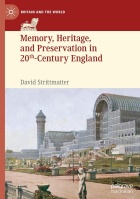
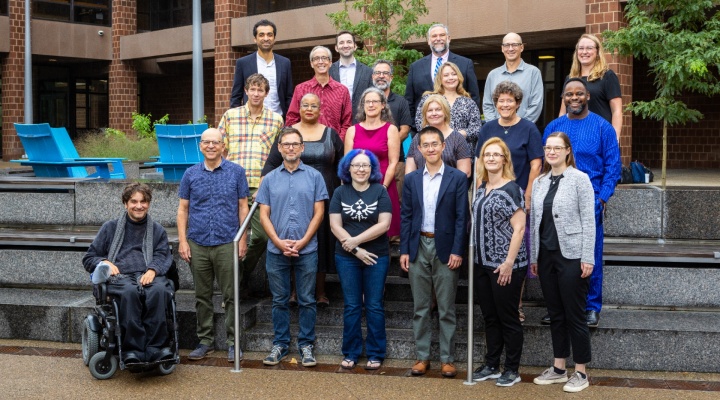
In this Issue:
Support your Department
Department of History faculty and staff in Fall 2023.
Greetings from Park Hall! As you will see in this year’s History Matters, the department has been very busy over the past year, welcoming new colleagues, recognizing the achievements of our students, and planning new programs to further enliven our curriculum and co-curricular activities. Most absorbing for me as chair is our participation in UB’s Disciplinary Excellence initiative, launched by our Provost in response to the state’s increased investment in SUNY over the past two years. The Provost asked every UB department to determine how new resources could be used to heighten its visibility, strengthen its research profile, and attract excellent students. Our department put forward a proposal to build on our strengths in the history of science, health, and disability. We are coordinating in this area with several other departments around UB. Our proposal was successful, and we have been authorized to hire three professors to support this Disciplinary Excellence initiative. The searches are underway now, and I hope to be able to report in this space next year that they all achieved their aims.
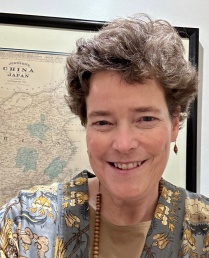
Kristin Stapleton
Professor and Chair
Running searches, putting together our course schedule every semester, managing our finances, overseeing promotions and commencement and innumerable other activities – all of this requires much time from our hard-working staff. Unfortunately, last spring our colleague Amie Schirching departed to take up a position at Buffalo State. We are hoping to hire another staff person soon. In the meantime, Department Administrator Michelle Burger has done a fantastic job of making sure essential work gets done, and Communications Coordinator Shayna Devlin has begun handling aspects of student services, in addition to many other tasks (such as producing this newsletter). On behalf of the whole department, I thank them.
As you may have seen via an email message from me on October 12, I am working on a project to document the history of our department. Students in an oral history class I am teaching this fall will conduct interviews with alumni and retired faculty members. If you’d like to participate, please contact me. Eventually, I plan to put together a departmental history that can be made available via our website. Stay tuned!
Kristin Stapleton
Professor and Chair
Inaugural Francis J. and Shirley A. Wozniak Lectureship in History
Written by Claire S. Schen, Chair of the Speakers Committee, 2023-2024
The Department of History is delighted to announce the first annual Francis J. and Shirley A. Wozniak Lectureship in History to be held on April 5, 2024. Wanting to make a difference in the University at Buffalo community and remembering the faculty who had fostered a creative and challenging learning environment, Mr. and Mrs. Wozniak endowed the Lectureship through a planned bequest. They intended to benefit students and faculty with their generous gift, and the Department’s first speaker embodies the Wozniaks’ goal of furthering the development of students and faculty. Professor David Nirenberg, the Director and Leon Levy Professor at the Institute for Advanced Study in Princeton, New Jersey, will lecture in April 2024. The Institute he directs is a renowned center of historical research and intellectual inquiry, where some UB faculty have spent productive research leaves. Further, Professor Nirenberg is a gifted and prolific historian of the relations of Jews, Christians, and Muslims in medieval Europe and the Mediterranean region. Through his historical inquiry, he engages topics that resonate in our contemporary times, such as racism, anti-Semitism, and Christian-Muslim relations. His work has engaged undergraduate and graduate students in many of the classes taught in the Department of History. The Department is grateful for the Wozniaks’ bequest and their desire to foster awareness by enabling us to bring an internationally recognized scholar and public intellectual to campus. The talk will be open to the public. We hope all those interested will attend and will send out details early in 2024.
Francis Wozniak graduated Magna Cum Laude from the University at Buffalo with a degree in History after serving in the US Army Air Corps in World War II. Shirley Wozniak was a graduate of the Albright Buffalo Fine Arts Academy. Longtime residents of New York State, they retired to Fredonia, near their hometowns, and passed in 2018. The Department of History acknowledges the generosity they have shown to students and faculty. We would like to take this opportunity to thank them and the other graduates and former faculty who have generously supported the Department in its research and teaching endeavors.
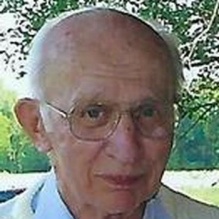
Frank Wozniak
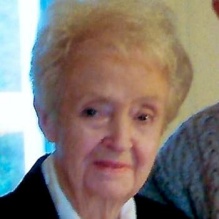
Shirley Wozniak
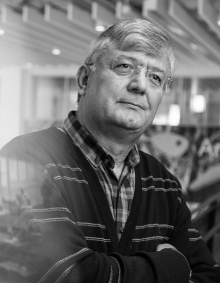
This Fall Dr. Suleyman Demirci, a former tenured professor of early modern Ottoman history, has joined the Department of History as part of UB’s Scholar’s at Risk Fellowship Program. UB’s Scholars at Risk program is open to any scholar of any country and any discipline with a terminal degree who has a documented record of scholarship that meets an appropriate standard in a field represented at UB, and who faces the risk of persecution in his/her own country. During his fellowship, Prof. Demirci, who is known for his work on Ottoman Turkish taxation from the 1620s-1700, is examining the higher educational system in the U.S. with particular references to the SUNY system. He told UB Now, “This will also help me in conducting research, enrolling teaching activities and writing up articles in a safe and secure scholarly environment.” You can read more about Prof. Demirci and the Scholars at Risk Program in UB Now.
On October 17, 2022, UB welcomed 34 VITAL Scholars (UB’s Visiting Future Faculty program). Of the 34 outstanding scholars, five are PhD candidates in History. During their weeklong visit, the VITAL Scholars participated in workshops and events in the Department of History, including workshops with Prof. Robin Mitchell and presenting their research to the Department of History faculty. The Department of History was pleased to welcome:
- Elizabeth Barahona, U.S. History, Northwestern University
- Adam Mcneil, History, Rutgers University
- Daniel Morales-Armstrong, History/Africana and American Studies, University of Pennsylvania
- Udodiri R. Okwandu, History, Harvard University
- Clifton E. Sorrell III, History, University of Texas at Austin
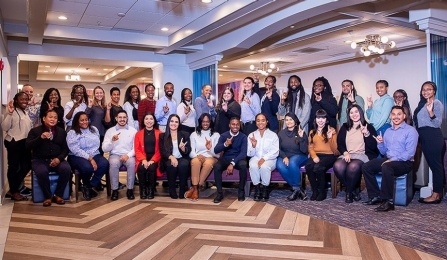
Participants in this fall's VITAL program gather for a group photo on Monday in the Hampton Inn on Delaware Avenue before heading out on a bus tour of Buffalo. Photo: Meredith Forrest Kulwicki
On October 16, 2023, the VITAL program returned to UB and the Department of History hosted two VITAL scholars, Shakti Castro, History, Columbia University and Amy Fallas, History, UC Santa Barbara. In addition to workshops facilitated by UB, the 2023 VITAL Scholars engaged in workshops with Prof. Robin Mitchell and Distinguished Visiting Scholar Dr. Christy Garrison-Harrison and toured the Michigan Street African American Heritage Corridor.
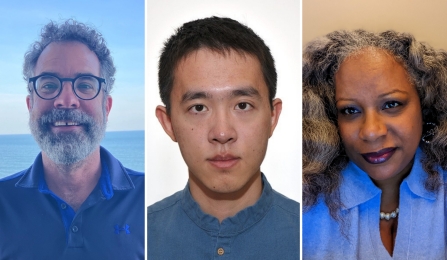
The Thomas B. Lockwood Professor of Latinx History Pablo Mitchell (left), Visiting Assistant Professor Zhongtian Han (middle) and Distinguished Visiting Scholar Christy Garrison-Harrison.
Meet the New Faculty
The department is excited to introduce two new faculty members, Pablo Mitchell, PhD Thomas B. Lockwood Professor of Latinx History, and Zhongtian Han, PhD Visiting Assistant Professor.
We're also excited to welcome Distinguished Visiting Scholar Christy Garrison-Harrison, PhD.
Pablo Mitchell is the Thomas B. Lockwood Professor of Latinx History. He is the author of "West of Sex: Making Mexican America, 1900-1930" (2012) and "Coyote Nation: Sexuality, Race, and Conquest in Modernizing New Mexico, 1880-1920" (2005). A paperback edition of his Latina/o History textbook, "Understanding Latino History: Excavating the Past, Examining the Present," was released by ABC/CLIO in 2017. He is also the co-editor of "Beyond the Borders of the Law: Critical Legal Histories of the North American West" (Kansas University Press, 2018) and has recently completed a digital history project, “Reclamation Projects: An Archive of Queer Latinidad,” for Queer Pasts. His current research examines the history of Latina/os in US higher education at the turn of the twentieth century.
Zhongtian Han is a Visiting Assistant Professor of Chinese History. Zhongtian is a historian of modern China, specializing in the Chinese Communist revolution, science and technology, and intelligence. His work on these topics has been published in "War in History." Zhongtian’s book project, Institutionalization within Revolution: The Chinese Communist Party’s Radio Communications and Reconnaissance, 1930–1953, uses Chinese, Japanese, and English-language archival sources to analyze how the Party employed radio technologies to create an institutional framework to centralize the revolutionary movement and seize intelligence advantages in military struggles. His second book project explores how the Party developed the intellectual and institutional frameworks of meteorology to build a knowledge infrastructure for the socialist state in the 1950s and 1960s.
Before joining the University at Buffalo, Zhongtian received his PhD in history from George Washington University. He was also a Hans J. Morgenthau fellow of grand strategy at the University of Notre Dame. Additionally, Zhongtian has been the instructor of record for graduate and undergraduate Asian history courses at the University of Pennsylvania and the University of Maryland, College Park.
Dr. Christy Garrison-Harrison’s primary research foci are on the American South (with a concentration on Black women’s political leadership and influence upon economically developing Black communities within the region,) Black Womanist Geographies, and the cultural dynamics of White American matriarchy. Secondary research interests include Afro-Latinx community advocacy and Black Women in colonial Europe and America. Dr. Garrison-Harrison is the second author on an Africana Women’s History textbook scheduled for Fall, 2023 publication, is currently completing a solo manuscript on Black women’s community activism in Atlanta, Georgia during the modern Civil Rights’ Movement era, and developing a manuscript on the role of Matriarchy in antebellum American culture. Her most recently completed article is Remembering Jacqueline Anne Rouse, 1950–2020: Scholarship, Educational Advocacy, and Mentoring as Audacious Leadership, co-authored with Dr. Kenja Foster McCray and Dr. Charmayne E. Patterson. In conjunction with Southern University and Agricultural & Mechanical College’s Department of History, she developed an initial roundtable series centering Black Women’s activist-scholarship. She is expanding the series to spotlight Latinx and Indigenous scholars in the upcoming academic year.
Prof. Tamara Thornton Retires
Written by Prof. Carole Emberton
This year we bid a fond farewell to Professor Tamara Thornton, who retired after thirty-one years in the department.
Her colleagues will also miss her good humor and wisdom. We wish her well on her new ventures, which include a book on the history of globes. We look forward to its publication in the near future!
Before joining us in 1992, Prof. Thornton taught for three years at SUNY-Fredonia. A renowned scholar of early American culture, Prof. Thornton is the author of three books, including Nathaniel Bowditch and the Power of Numbers: How a Nineteenth-Century Man of Business, Science, and the Sea Changed American Life (2016), Handwriting in America: A Cultural History (2006), and Cultivating Gentlemen: The Meaning of Country Life among the Boston Elite, 1785-1860 (1989). At UB, she taught courses on American cultural history, the history of the American landscape, crime and punishment, and intellectual history. She was a dedicated and immensely popular teacher, and the halls of Park Hall are notably quieter without the throng of students often lining up outside her door for office hours.
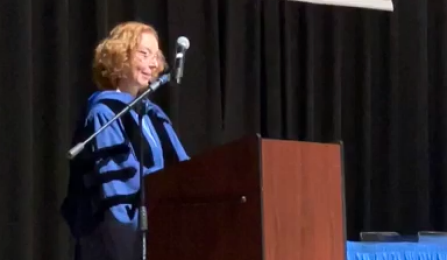
Prof. Tamara Thornton was the 2023 Department of History Graduation Commencement Speaker.
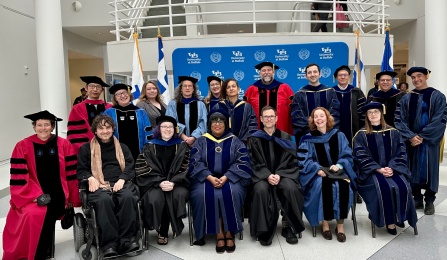
Department of History faculty before Spring 2023 Commencement.
Faculty Features
Learn more about our faculty members’ special projects!
An academic career can be deeply rewarding, but it sometimes lacks variety. This was one reason that I was eager to take on the role of director of UB’s Gender Institute. I was also drawn to the opportunity to work with colleagues across the university and community who care deeply about issues related to gender and sexuality. As the only research center that focuses on women, gender, and sexuality in the entire SUNY system the Gender Institute has nurtured students and scholars for more than a quarter century. Because I believe so strongly in the Gender Institute’s mission, I will be doing all I can to increase the visibility of the Institute, both within the university and in the broader community. We are at a crucial moment in our history, with concerted attacks on the LGBTQ community, particularly transgender people, and the loss of reproductive rights. The Gender Institute can play a vital role at this moment, bringing feminist scholarship across all disciplinary fields to the wider public. I’ve spent much of my summer organizing programming for the coming year and seeking external funding for the institute. This has already pushed me outside of my academic comfort zone. But I view my research and teaching as intricately linked to my new administrative role. And I’m looking forward to amplifying the voices of scholars who place gender and sexuality at the center of their research.
The opioid overdose crisis is no longer in the headlines, but that doesn’t mean it has gone away. In fact it’s getting worse, with more deaths every year. The nature of the crisis is also shifting, as deaths are now rising fastest among minority communities. We are in dire need of solutions to the crisis that address what scholars call “the social determinants of health,” i.e., the social stratifications and inequalities put some communities at higher health risks than others, and that transform individual risks into public health crises.
To address this need, David Herzberg led a group of faculty experts in the College of Arts and Sciences, Medicine and Biomedical Sciences, Public Health, Nursing, Law, Social Work, and Education to develop a new MA program called “Drugs, Health and Society.” Most academic work in the addictions space is housed in the sciences—in biomedicine, or psychology, or treatment. Our new program is unique in that it is truly multidisciplinary, led by Herzberg, an internationally recognized expert in the social and political dimensions of drugs and addiction. The goal is to train the next generation of experts in all aspects of drugs and addiction as a scientific, social and political problem, so that we can address the overall social crisis as well as the individuals harmed by it.
Since 2017, Assistant Teaching Professor Sarah Handley-Cousins and her colleagues, UB History PhD alums Marissa Rhodes, Averill Earls, and Elizabeth Garner Masarik, have produced nearly 200 episodes of DIG: A History Podcast. While the episode topics vary broadly - in just the past year, they’ve produced episodes on Chinese medicine, Irish radical Roger Casement, the fall of Rome, and Igbo and Ibibio resistance to British colonialism - they each present complicated and important history in an accessible way to public audiences.
This year, they expanded beyond the audio format and have written a book, Spiritualism’s Place: A Reflective History of Lily Dale, NY. The book centers on the intentional Spiritualist community of Lily Dale, located about an hour south of Buffalo on Cassadaga Lake. Founded in 1879, the community began as a camp meeting location for Spiritualists but grew into a quaint, year-round village that played an important role in the suffrage and temperance movements as well as a target for investigations into the authenticity of spiritualists claims of communication beyond the grave. Today, it remains a popular summer destination for those hoping to commune with the dead or delve into New Age philosophy. Inspired by the tone of the podcast, the book is deeply researched but also approachable, allowing the personalities and friendships of the authors to shine through. The book will be released by Cornell University Press in 2024.
Jenifer Barclay received a 2023-24 Humanities Institute fellowship that will support work on her next book project, Between Two Worlds: A Black Disability History of Southern Education from Emancipation to Integration. Over the spring and summer, she presented some of this new research at the American Historical Association and the Berkshire Conference of Women’s Historians. She participated in a roundtable at the Society for Historians of the Early American Republic – “New Histories of Race-Making in Early America” – that showcased her book, The Mark of Slavery: Disability, Race, and Gender in Antebellum America. She was invited to give a talk at Brown University’s Cogut Institute for the Humanities entitled “Cripping the Archive: Confronting Ableism at the Source.” The talk previews a collection of scholarship she is co-editing with Stefanie Hunt-Kennedy, Cripping the Archive: Disability, History, and Power.
Cari Casteel, assistant teaching professor of history, was quoted in "The Atlantic" in an article discussing how sweaty humans can get and how complaints of body odor have cultural roots that long predate the United States. She is also the chapter advisor for Phi Alpha Theta.
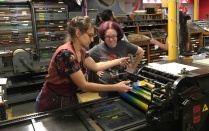
Cari Casteel learns the art of printing at WNY Book Arts.
Andreas Daum appeared in various German media to comment on John F. Kennedy’s enthusiastically celebrated visit to Cold War Germany in June 1963. He explained the political background and emotional implications in articles for the Frankfurter Allgemeine Zeitung and Tagesspiegel, as well as in a podcast for the Heidelberg Center for American Studies.
Carole Emberton’s recent book, "To Walk About in Freedom: The Long Emancipation of Priscilla Joyner," was named the 2022 Slavery Archive’s Book of Choice.
Sarah Handley-Cousins became the secretary of the American Association for the History of Medicine and is helping with efforts to celebrate the organization's upcoming centennial. She's also awaiting the publication of a cowritten history of the Western New York Spiritualist community, Lily Dale, and its place in the larger religious history of New York State, which she and her coauthors recently completed. The book, entitled "Spiritualism's Place: A Reflective History of Lily Dale, NY," will be published by Cornell University Press in 2024.
David Herzberg published a new book, "Whiteout: How Racial Capitalism Changed the Color of Opioids in America (2023)," with co-authors Helena Hansen and Jules Netherland. He also started research on his next book, a history of addiction in the health professions (doctors, nurses, pharmacists, etc.). He also co-authored an article with Anne Kveim Lie et al. in the American Journal of Public Health, “The harms of constructing addiction as a chronic, relapsing brain disease.” He also organized and hosted an international seminar, “The businesses of addiction,” with co-organizer Marie Jauffret-Roustide
Hal Langfur's book "Adrift on an Inland Sea: Misinformation and the Limits of Empire in the Brazilian Backlands" was released by Stanford University Press in January. With support from the History Department Faculty Research Fund, he spent June in Lisbon, working in the Ajuda Palace Library and archive, formerly the Portuguese royal library. He identified many valuable sources, both manuscripts and rare imprints, for his new book project on racial formation in the South Atlantic world. Among other talks, he presented the paper “All that Glitters: Native Knowledge and Regal Dreams in Southeastern Brazil, 1760s-1790s” at the annual American Historical Association Conference.
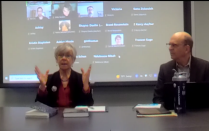
Prof. Hal Langfur (right) and Prof. Cynthia Radding (right) at Prof. Langfur's Book Celebration.
Yan Liu's first book "Healing with Poisons: Potent Medicines in Medieval China" won the 2023 William H. Welch Medal. He is a Fellow in the School of Historical Studies at the Institute for Advanced Study (IAS) in Princeton in Fall 2023 to work on his second book project on a transcultural history of aromatics in medieval China. His article "History of Aromatics in Premodern China" has been accepted by History Compass. He co-organized a roundtable on olfactory histories in Asia at the Association for Asian Studies Annual Conference in Boston and presented his paper on camphor at a workshop titled "Nexus of Knowledge: Science, Medicine, and Technology on the Silk Roads" at UC Berkeley.
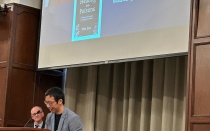
Prof. Yan Liu at the William H. Welch Medal presentation.
Ndubueze Mbah, was a 2022-2023 Joy Foundation Fellow at the Harvard Radcliffe Institute. He gave a public talk titled, “Abolition Forgery: A History of the Afterlives of Slavery,” at the Harvard Radcliffe Institute. He also published, “The Black Englishman of Old Calabar: Freedom and Mobility in the Age of Abolition in West Africa” in Radical History Review and “’Wives Wishing to Join Their Husbands:’ Colonial Forgery, Gender Legibility, and Labor Migration in West Africa” in History in Africa.
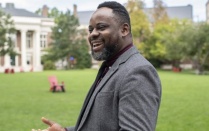
Prof. Mbah at the Radcliffe Institute Presentation.
Robin Mitchell was the invited guest speaker on “Sarah Bartmaan: A Life on Show,” for Betwixt the Sheets: The History of Sex, Scandal, and Society podcast. She gave talks at Washington and Lee University, Johns Hopkins University, and Clark University. After completing a year as a Distinguished Visiting Scholar at UB, she transitioned to a full-time tenured faculty position here. She successfully helped organize the French Colonial Historical Society conference this past May in Martinique and completed a stint as the VP of the society. Prof. Mitchell is currently writing the biography of Suzanne Simon Baptiste Louverture for Princeton University Press.
Dalia Caraballo Muller was a 2022-2023 Humanities Institute Fellow. She was named a participant in the Karen Lee Spaulding Fellowship for Leaders of Color program. She presented at the UB Center for Information Integrity’s “Misinformation in Social Media and What to do About It” symposium. Prof. Muller also presented “Impossible Futures: Tragic Time and Freedom Dreaming in Post Emancipation Cuba” as part of the Scholars@Hallwalls series.
Mark Nathan published a chapter, “Using the Courts to Litigate Monastic Celibacy in South Korea (1955–1970),” in the edited collection "Buddhism and Comparative Constitutional Law."
Michael Rembis was quoted in the Bloomberg Government article, “US Law Favoring Vendors With Disabled Staff Tested by E-Commerce.”
Claire Schen made a post-pandemic return to the archives in Britain while on sabbatical. Her research on pirates, captives, and the sea took her to the British Library and the National Maritime Museum, where she read documents, including captains’ journals, consulted published maps and unpublished maritime charts, and studied maritime painting of the seventeenth century.
Erik Seeman spent Spring 2023 as a Fulbright Research and Teaching Fellow at the University of Erfurt in Germany. While there he read eighteenth-century German funeral sermons at the Gotha Forschungsbibliothek (Research Library) and completed “Deathbed Scenes in the Early Modern Atlantic World: Cross-Cultural Perspectives,” which will appear in a volume edited by two of his Erfurt colleagues. He took a research trip to the National Archives in London for his current book project on Boston’s 1721 smallpox epidemic. He also taught an undergraduate seminar, “Death and Dying in America and Europe.” He found time for long bike rides and tennis on the red clay that Germans love.
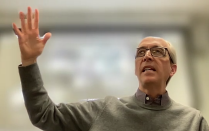
Prof. Erik Seeman presents on his current research.
Kristin Stapleton attended the 2023 annual meetings of the World History Association and the Urban History Association to discuss her recent publication, "The Modern City in Asia." She and two colleagues in modern Chinese history at Cambridge University (England) and Nanyang Technological University (Singapore) are editing the “Sage Handbook of Interpreting Chinese History”: a collection of essays on how Chinese understandings of historical events and various other aspects of Chinese history have changed over the last 150 years. While engaged in this project, she is also continuing to work on her translation of a Chinese novel that documents life in West China during World War II. She expects to see her translation in print within a year or two.
Camilo Trumper participated in a city-wide seminar that brought together ten different Chilean History Departments to commemorate the 50th anniversary of the military coup that deposed the democratically elected government of Chile’s president, Salvador Allende, in 1973. He contributed to an edited collection that accompanied the exhibition “How to Design a Revolution,” which opened in September in the basement of the presidential palace that was bombed in the 1973 coup.
At UB, Dr. Trumper directs the inaugural “Latinx Students and Studies Initiative,” which seeks to support Latinx student success and faculty research. He co-organizes the Faculty of Color Writing Group.
Victoria W. Wolcott’s book, Living in the Future: Utopianism and the Long Civil Rights Movement, was awarded the Living New Deal book award and the Elise M. Boulding Prize in Peace History. Prof. Wolcott traveled to Hyde Park, New York, in June to accept the New Deal prize and participate in the Roosevelt Reading Festival. Prof. Wolcott also presented a book talk at Dumbarton Oaks in Washington, D.C., and presented papers at the Organization of American Historians Conference and the Utopian Studies Conference. On July 1, she became the director of UB’s Gender Institute.
Gene Zubovich spent the 2022-23 academic year working on his new book project, which is tentatively titled "Culture Warriors Abroad: A Global History of the American Culture Wars." He conducted research for the project at Stanford University and Notre Dame University. Out of this research came a new article, “The U.S. Culture Wars Abroad: the Liberal-Evangelical Rivalry and Decolonization in Southern Africa, 1968-1994,” which was published in the Journal of American History. He also published an article on Christianity and human rights in Modern American History and two chapters in edited volumes. Prof. Zubovich was tenured and promoted to the rank of Associate Professor.
Katherine Zubovich has been promoted to the rank of Associate Professor. Her book "Moscow Monumental" was published in Russian translation by Corpus. The book also received an honorable mention for the Alexander Nove Prize in Russian, Soviet, and Post-Soviet Studies of the British Association of Slavonic and East European Studies.
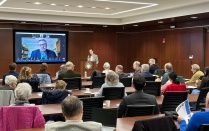
Prof. Katherine Zubovich moderates a panel at the 2023 Allison Des Forges Symposium.
Written by Prof. Michael Rembis
The graduate program is revitalizing itself in the wake of the pandemic. We welcomed five bright, dynamic PhD students in 2023: Fernando Jauregui, Chijioke Ngobili, Michael Samul, McKensie Sprow, and Jessica Sullivan. Our already strong MA program has benefited further from an influx of UB Teach students working on their credentials to teach in the K-12 classroom. Our MA and PhD students, as well as UB Teach students and students from other departments, bring their diverse experiences, backgrounds, knowledge, and wisdom into the classroom, where they engage in vibrant and wide-ranging discussions. Outside the classroom, our students are conducting cutting edge research, attending conferences, and engaging in valuable work in the community. Valuable support from our donors and other sources enables our graduate students to come from across the country and around the world to UB to study. When they leave our program, our graduate students are well prepared for a competitive job market.
New PhDs
In the Spring and Summer of 2023, three PhD candidates successfully defended their PhD dissertations. Congratulations new PhDs Emily Bowlus-Peck, Eric Deutsch and Brent Rosenstein!
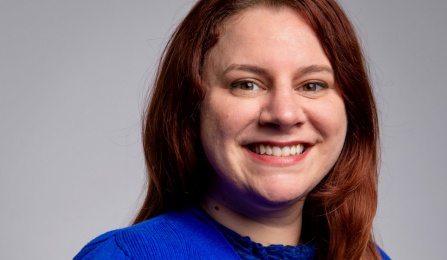
Emily Bowlus-Peck
“The Rise of Public Hospitals for the Mad in Eighteenth-Century London: A Proto-Psychiatric Movement”
Abstract: This dissertation focuses on the “proto-psychiatric” movement in eighteenth-century London. Medical practitioners observed a patient’s behavior, symptoms, and emotions to determine whether the patient was “curable” or “incurable.” Those deemed “incurable” were displaced within society. My work follows the London hospitals Bethlem, St. Luke’s, La Providence, and Guy’s Hospital, all of which were involved in admitting the first incurable patients. By studying each hospital’s admission requests, institutional operations, patient case studies, and leading hospital practitioners’ published works, I discovered that these hospitals produced the first forms of incurable or long-term care in England.
The development of the “proto-psychiatric” field itself was largely a cultural construction of the eighteenth century. Language and linguistics as well as social values and beliefs influenced diagnosis, prognosis, and medical care. In particular, I examine the mental maladies madness and melancholy and trace the development of “proto-psychiatry” through the growing distinction between curable and incurable maladies as well as the rise of incurable care within these voluntary hospitals. This project focuses on socio-medical studies and methodology, while recognizing economic and political influences. The development of incurable versus curable care continued to influence the psychiatric movement of the nineteenth century. Moreover, by comparing early modern medicine to current studies of mental conditions, I determine that modern-day psychiatry continues to be an amalgamation of science, medicine, and cultural conditions.
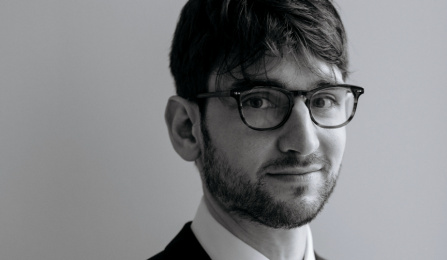
Eric Deutsch
“Shepherding Independence: The Guide Dog Movement in the United States and the Construction of Disability, Rehabilitation, and Citizenship, 1927-1941”
Abstract: This dissertation is a sociocultural history of the guide dog movement in the United States, analyzing discourses regarding disability and rehabilitation to illustrate how the movement reflected and entrenched dominant understandings of disability vis-à-vis citizenship, notions of the latter linked to considerations of gender, race, age, disability, work, pity, charity, and mobility. This work is focused on the formative years of the guide dog movement, roughly 1927 through 1941, and utilizes media publications and public records to reveal the connections between rehabilitations and portrayals of such to meanings of deservingness and civic engagement. This work argues that the guide dog movement, and coverage thereof, validated prejudicial notions of disability that substantiated disabled people’s social and civic marginalization. Finally, this work considers the creation and sociocultural impact of historical memory regarding the guide dog movement.
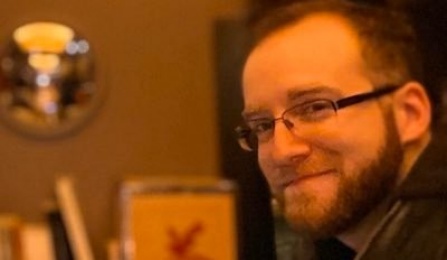
Brent Rosenstein
“The Face of the Nation: Drogmans and the French State, 1669-1880"
Abstract: By the late seventeenth century, French officials were inundated with complaints about having to rely on local interpreters in the Mediterranean, centering on their unreliability. In response, France began to create its own drogmans - agents trained from childhood to serve as interpreters and to advance French economic and diplomatic interests abroad. The state spent the next two centuries attempting to refine the training of the drogmans, who gradually rose to greater prominence in French society. Constructed as intentionally liminal figures, the drogmans came to play a key role as cultural mediators, serving as the primary lens through which France understood the Islamic world. By examining the drogmans' training and their relationship with the state, we can see how France attempted to shape the way that it was represented in the Mediterranean. Moreover, looking at the ways in which individual drogmans actually carried out their duties shows us how French perceptions of the Islamic world changed dramatically across this period, shifting from a more pragmatic and balanced stance in the eighteenth century to a full embrace of the imperial mission in the nineteenth century.
Graduate Student Updates
Ryan Adams, PhD Candidate, was the GHA President for the 2022-2023 academic year and was awarded a Milton Plesur Pre-Doctoral Fellowship as well as a Department Travel award.
Brandon Burger, PhD Candidate, was the recipient of the 2023 Department of History Yearley Award. In Spring 2023 he was a co-organizer for a Digital Scholarship roundtable in the Dept. of History.
Angela Gallagher, PhD Candidate, was awarded a Milton Plesur Pre-Doctoral Fellowship. She conducted research at several archives in the UK and Ireland in Spring and Summer 2023.
Kevin Kostin, PhD student, is the History Dept. representative to the Graduate Employee Student Union.
Jenna Labbie, PhD Candidate, was awarded a Milton Plesur Pre-Doctoral Fellowship. She is currently completing her research year. Her research centers on gender, human rights, and the United States' relationship with Latin America during the Cold War.
Ashley Morin, PhD Candidate, presented, “Violence Always Destroys: A Spatial Analysis of Peace and Conflict” at the School of History, Anthropology, Philosophy and Politics at Queen's University Belfast. In Spring 2023 she was a co-organizer for a Digital Scholarship roundtable in the Dept. of History. Over the summer she taught HIS 318 History of Ireland at UB.
Tory Nachreiner, PhD Candidate, taught HIS 367 Women, Gender, and Sexuality in Africa at UB in Fall 2023. She is working on her dissertation, "A Marriage of Aesthetics: Afropolitan Consumption, Bodily Practices, and Cis-Atlantic Gendering in Old Calabar, 1840-1940," which examines how men and women in southeastern Nigeria navigated changing meanings of womanhood, masculinity, and marriage as the influence of Christianity, British colonialism, and Atlantic commerce increased in the region.
Breanna Pelonero, a second year MA student and high school global studies teacher, is writing her MA thesis on how enslaved and free women of color utilized African cultural and religious practices to combat racial hierarchies in New Orleans in the first half of the 19th century.
Beth Pryor, PhD student, is researching muskets and their socioeconomic and political impact on the British Atlantic World.
John Root is in the second year of his MA. He is the 2023-2024 GHA president. He was also the editor for two published volumes, Once Upon a Time… by Ida Gregoire M.D. and A Primer For Eighth Graders: An Introspective Journal by Ida Gregoire M.D. both published in 2023.
McKensie Sprow started her PhD at UB this year. She recently completed an MA at Columbia in Latin American & Caribbean Studies. She is interested in researching 20th century Latin American history, specifically how the intersection of politics and religion impact reproductive health in the Southern Cone.
Ashley Tibollo, PhD student, was awarded a Department Travel Award. She also had her review of Sean Morey Smith’s “Medicine & Healing in the Age of Slavery” published on H-Net
Shu Wan, PhD Candidate, was featured in the UB Now article, “Graduate student studies experiences of Chinese-Americans during COVID”. Shu was awarded a Milton Plesur Pre-Doctoral Fellowship, a Baldy Center Research grant, and the Graduate Student Research Community Grant from the Office of International Education.
Graduate Awards
Outstanding MA Thesis Prize
James Coughlin, “City of Distant Neighbors: The Proliferation and Entrenchment of Residential Segregation in Buffalo, New York (1934 to 1961)”
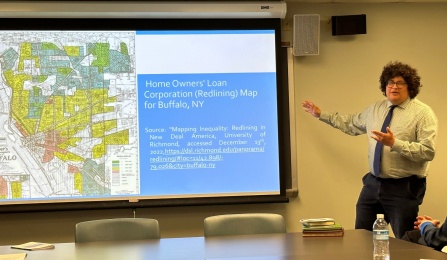
James Coughlin presents his MA thesis at the Department of History 2023 Thesis Celebration.
Abstract: "City of Distant Neighbors" is intended as an accessible history for those seeking to change the numerous inequalities wrought by Buffalo, New York's racial segregation. It is a work of love and commitment to the Buffalo community. The inspiration for "City of Distant Neighbors" was born from three injustices impacting Buffalo's Black community. First, the heinous and tragic Jefferson Avenue Tops massacre on May 14, 2022 by a white supremacist terrorist, was a targeted attack aimed at Black Buffalonians that shook Buffalo to its core. Amid mourning May 14th, Buffalonians of all backgrounds began asking "how did Buffalo, a city that purports to be the 'City of Good Neighbors' get to be so segregated?" Yet as many sought to "choose love," the bare minimum was done to address Buffalo's systemic racism and segregation. On December 23, 2022, an abysmally prepared Buffalo incurred a second injustice, the cataclysmic "Christmas" blizzard, claiming an estimated forty-seven lives, disproportionately impacted the city's East Side. Buffalo's 2022 Christmas Blizzard once again brought the city's residential segregation to the forefront of conversation.
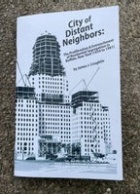
This work of history attempts to trace the historical roots and processes of Buffalo's racialized residential segregation. It is not intended to be a complete or holistic history which leads up to the present. Rather, the years 1934 through 1961 are emphasized because an effort was made by federal and local government, Buffalo's real estate industry, and white Buffalonians to segregate Buffalo's Burgeoning Black population. Furthermore, it seeks to illuminate the experiences and resistance of everyday, yet extraordinary, Black Buffalonians who wanted their city to live up to its City of Good Neighbors moniker. Also of note, is that "City of Distant Neighbors" does not discuss the Kensington Expressway's construction, which stands as the most visible example of Buffalo's segregation. Rather, preceding events and processes before the Kensington's construction show how Buffalo's segregation was well underway. Lastly, by hoping to provide an accessible history, "City of Distant Neighbors" seeks to be a political education tool for those wanting to address Buffalo's third injustice, the detrimental impacts of Buffalo's segregation. It is dedicated to those who lost their lives in the May 14th, 2022 Tops massacre and the 2022 Christmas Blizzard.
Copies of James’ MA Thesis are available through Burning Books. James has also presented his work on numerous occasions, a recording of his presentation on February 9, 2023 is available.
Honorable Mention:
Molly McCreedy
“’The World is Afraid of Black Female Champions:’ Colonialism and Racial Othering in Women’s Sport”
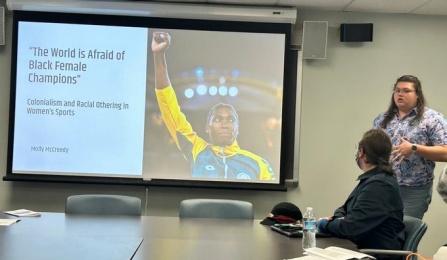
Molly McCreedy presents her thesis at the 2023 Department of History Thesis Celebration.
Molly’s MA thesis was created using StoryMaps and is freely available to read at the link above.
Milton Plesur Conference Report:
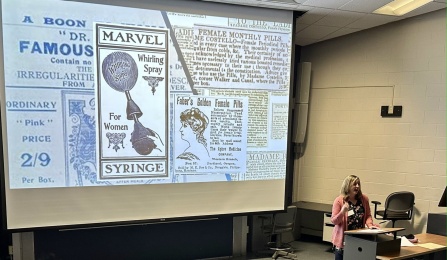
Keynote speaker Dr. Lauren MacIvor Thompson.
Written by Ryan Adams, 2022-2023 GHA President
We are proud to report that the 31st Annual Milton Plesur Graduate History Conference, held on March 10-11th, was a resounding success. This was the first Plesur conference since the COVID-19 pandemic began in 2020. As a result, we sought to organize a conference that grappled with the realities of historical research in the present day. The theme of the conference was “The Presence of History: Historical Research and the Politics of the Moment,” which sparked important discussions about the role of historical knowledge in contemporary debates across our society. We were delighted to host Dr. Lauren MacIvor Thompson, Assistant Professor of History and Interdisciplinary Studies at Kennesaw State University, to give a keynote address entitled “Before Roe: A Century of Reform in Reproductive Law and Medicine.” Her keynote address perfectly set the stage for a conference full of fantastic panels that covered a broad range of topics, methodologies, and geographies. The conference hosted panelists from six different universities covering a range of geographic locations and time periods. We even included a panel on the use of maps in historical research. In addition, we were pleased to host a roundtable entitled “Doing the Work: Amplifying Marginalized Voices and Stories,” featuring Dawnavyn James, Dr. Robert Caldwell, Dr. Shanleigh Corrallo, and Dr. Averill Earls. The roundtable fostered an important conversation about how historians can make history more relevant to non-academic audiences and promote histories of marginalized communities. We are especially grateful to the roundtable participants for their insights and ideas about how to be more accountable and accessible to the communities we live in.
Although this was the first Plesur conference in a few years, we believe it was an unequivocal success and hope the tradition will continue into the distant future.
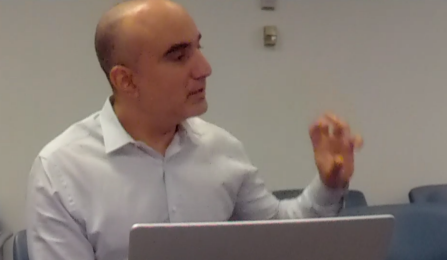
Camilo Trumper, Director of Undergraduate Studies
Written by: Professor Camilo Trumper, Director of Undergraduate Studies
Greetings from the Department of History’s interim Director of Undergraduate Studies. This will be my second stint as DUS: I served as DUS for three years before passing the baton to Professor Daum; I will be occupying the position for the 2023-2024 Academic Year, before Prof. Daum returns next year.
We have had a busy and exciting past year. We have expanded our course offerings in Latinx History, the Islamic World, and the Atlantic World. Our History Honors cohort has remained strong, hovering around the double digits again this year. And we continue to create new and exciting opportunities in and beyond the classroom.
The Department doors are always open to our students. We work hard as a Department to build a welcoming and inclusive community for and with our students. We offer monthly Lunch Meetings and Coffee Breaks, opportunities for students to gather, break bread, hear from guest speakers, and learn about the many opportunities we offer our students, including internships, study abroad programs, and combined programs in Social Science Education and Law. We also hosted informal Study Halls in during Finals week in the Fall and Spring, with hot chocolate, tea, snacks, and community building and destressing activities. Finally, the Department revived a pre-pandemic activity - History Movie night - with a showing of the 1954 film Godzilla; we hope that this will become an annual tradition!
In fact, we continue to build on the success of these initiatives in the upcoming months. This year, we inaugurate the Undergraduate History Association. This will also mark the first year of our History/Library Science degree, which builds on the success of our combined degree programs with the School of Education and the Law School.
Please do not hesitate to reach out with any questions: ctrumper@buffalo.edu.
Undergraduate Award Winners
Our undergraduate students have been recognized both inside and outside of the UB community for their outstanding achievements!
Fulbright Winner:
- Russel Bassarath
Russel is currently teaching in Cyprus.
SUNY Chancellor's Award for Student Excellence:
- Connor Whitney
In Spring 2023, The Department of History was able to award numerous scholarships, prizes and awards thanks to the generosity of our friends and donors!
College of Arts and Sciences Outstanding Senior
- Russel Bassarath
Department of History Outstanding Senior
- Noah Bruster
Best Undergraduate Thesis Prize
- Ryan Cocchiarella, “Media, Drugs, and their Role in Shaping the Memory of the Vietnam War”
Best Undergraduate Seminar Paper Prize
- Michael Rechichi, “William Dampier’s Travels in the Pacific Ocean”
Milton Plesur Memorial Scholarship Winners
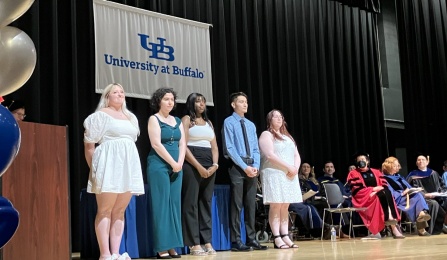
2023 Milton Plesur Memorial Scholarship Winners.
- Rafi Ahmed
- Atallia Brown
- Rebecca McGlynn
- Elizabeth Mellors
- Leah Perry
- Elliot Seminario
- Fiona Serrano
- Darcy Winter
Bryan G. Argo Memorial Scholarship Winner
- John Graber
Joyce J. and John D. Milligan and Family Scholarship Winners
- Joshua Brice
Department of History Undergraduate Diversity Scholarship Winners
- Zachary Henry-Daniel
- Alexi Lodes
- Melanie Thompson
Department of History Merit Scholarship Winners
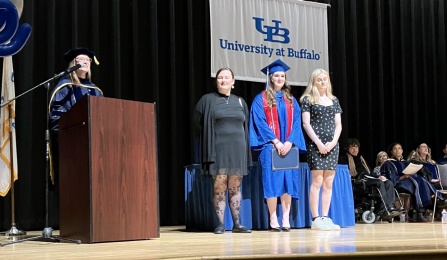
2023 Merit Scholarship Winners.
- Mia Delap
- Montana Desabio
- Isabella DiMura
- Mary Dixon
- Megan Dreher
- Jacob Klink
- Aurora Liu
- Teresa Sciandra
- Kate Stiglmeier
- Hongyu Zhao
Schoellkopf Award for Study Abroad Winner
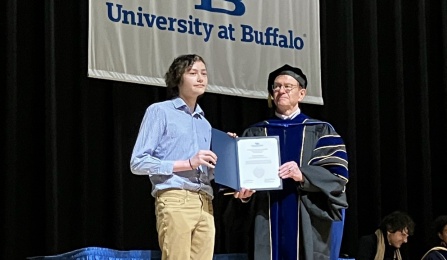
Study Abroad Scholarship Winner.
- Nicholas Sarris
Please consider donating to our scholarship funds to continue to make these and other awards and scholarships possible!
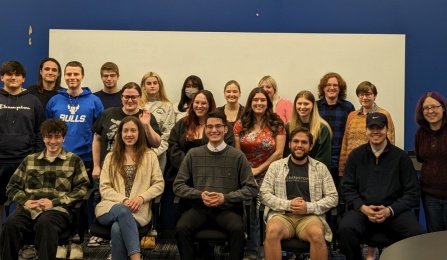
Written by Prof. Cari Casteel
Phi Alpha Theta Chapter Adviser
Phi Alpha Theta at UB continues to grow. It has been a busy year but next year will prove to be even more so.
This year, we inducted 30 new undergraduate and graduate members. Last September, we held the first PAT-sponsored Welcome Event for new and returning history students. The event was a success, and this year’s equally successful 2nd Annual Welcome Event was scheduled for Sept 20.
At graduation in May, PAT also organized and presented the chapter’s inaugural “Outstanding Educator Award” to my esteemed colleague Prof. Jenifer Barclay. This was fully facilitated by PAT students who wanted a small way to thank those who have been outstanding mentors.
Now to the big news…
In April six UB history students (Russel Bassarath, Haylie Byres, James Coughlin, Madison Feldman, John Root, and Sarah Wack) presented their work at the Phi Alpha Theta Regional Conference at Lemoyne College. They all did a fantastic job and did UB proud. Sarah Wack won the award for Best Graduate Paper. Russel and Madison won awards for their papers as well.
In April 2024, we will be hosting the PAT Regional/International Conference. This is an exciting time, and our students are thrilled to host scholars and present their work. As we finalize the dates, we will update you all. Hosting a conference is a huge undertaking and we welcome any donations of time or money to continue supporting PAT's growth here at UB.
2022 Phi Beta Kappa Inductees
- Alexis Heng
- Madelyn Lemay
- Danielle Redfield
- Caroline Spaulding
- Sarah Wack
Department of History Outstanding Senior: Noah Bruster
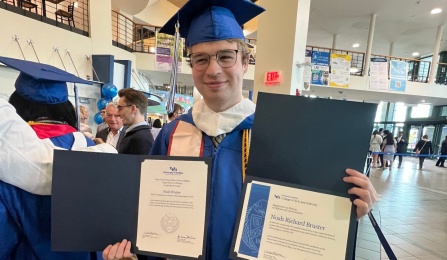
Hometown: Vestal, New York
Additional Major: Law BA
Why did you choose to major in History?
I chose to major in History because I have always found learning about and studying the past fascinating. I switched my focus to pre-law in my sophomore year, and I took HIS 161 – US History 1 with Dr. Casteel, as a Pathway course. I enjoyed this class so much that I decided to continue taking classes. I eventually added on a History Major because I truly fell in love with history and the History Department at UB.
What area of History do you find most interesting?
I have always felt drawn to United States History. I find it particularly captivating to learn about the history of the country I was born and grew up in. I especially liked to learn about the Revolutionary Period and the Early Republic. Ultimately, however, I loved all the classes I took, which spanned all different types of history.
What was your favorite class?
My favorite class was HIS 329 – US History since 1945 with Professor Wolcott.
Do you have any plans for after graduation?
I am currently attending the University of Miami School of Law and studying to earn my JD. I am on track to graduate in Spring 2026, and I hope to work as an attorney in the future.
Is there anything else you would like to share about your time at UB?
I loved my time at UB, and I could not have asked for a better undergraduate experience. The people and lessons I learned at UB were invaluable. The faculty and staff in the History Department truly encouraged me to work my hardest and take classes outside of my comfort zone. All the professors I had pushed me to be my best self, and I am where I am today because of it.
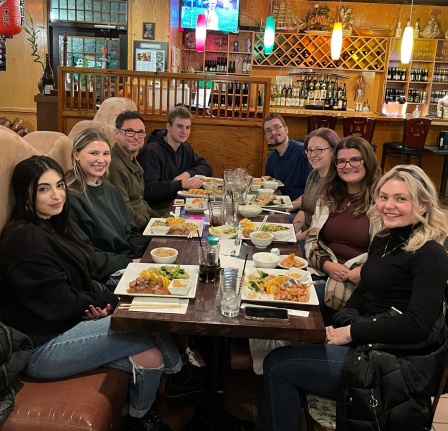
History Honors seminar went out for the Annual History Dinner at Fuji Grill in November (picture) with David Herzberg and Cari Castee.
Alumni Spotlight
David Strittmatter, PhD 2018
Hometown: Monticello, IA
David Strittmatter was a few years out from finishing his MA at St. Andrew’s University and working in Boca Raton, FL, when he decided to take on the challenge of a PhD. Initially, he wanted to research a topic related to golf and got in contact with Prof. Pat McDevitt at UB. Prof. McDevitt responded enthusiastically to David’s inquiry, and this set David on his path to UB. David spent 5 years at UB, an experience he says he greatly enjoyed. Once he finished his PhD he was ready to embark on an interesting career path. David is currently an Assistant Professor of History at Ohio Northern University, a position that when he graduated he did not envision himself holding. David wanted to pursue a career in public history, perhaps a curatorial position and maybe somewhere down the line become a museum director. With his abiding interest in public history and the UK, he also did not foresee the interesting twists his career would take.
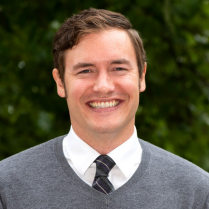
However, after a last-minute job application over summer 2018, David landed a different career path - a one-year Visiting Assistant Professor position at Washington and Jefferson College, which led to him applying for another Visiting Assistant Professorship at Ohio Northern which led to a permanent position at Ohio Northern. At both schools, David taught in small History departments and, therefore taught a variety of classes and subjects. His favorite topics are ones that center on public history and European history. One of David’s classes, World War Memory in Normandy & the Western Front, even goes abroad to learn about the world wars on site! He also teaches on subjects close to his initial research interests such as Tudor/Stuart England and Heritage Preservation.
David did not forget about his interest in public history. Though this was not the course he envisioned, David ended up combining his new career path with the one he thought he would have. He teaches several public history courses and currently has a fascinating ongoing public history project in the works that grew out of one of his courses: Kent State Oral History Guardsmen Project. “The Kent State Guardsmen Oral History Project seeks to record and document the perspective of the National Guardsmen in the narrative and memory of the Kent State shootings in May 1970. The voice curiously absent in the tragic event is that of the Ohio Army National Guardsmen, and this project hopes to address that void.” For David this is a particularly special project as not only is it local to his university, but it has also made him think about his career and interest in historical memory studies in a new way as it is a very different topic from what he normally researches. In fact, this is only one of David’s local public History projects. As he continues to settle into life at Ohio Northern, he and his students find more local projects such as the recent approval of an Ohio Historical Marker for Ray Brown, a star pitcher in the Negro Leagues who was posthumously inducted into the Baseball Hall of Fame!
He recently published his book "Memory, Heritage, and Preservation in 20th-Century England."
Alumni Updates
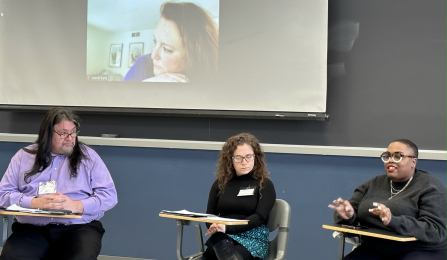
Plesur Roundtable entitled “Doing the Work: Amplifying Marginalized Voices and Stories,” featuring Dr. Robert Caldwell, Dr. Shanleigh Corrallo ’20, Dawnavyn James, and Dr. Averill Earls ’15 (via Zoom).
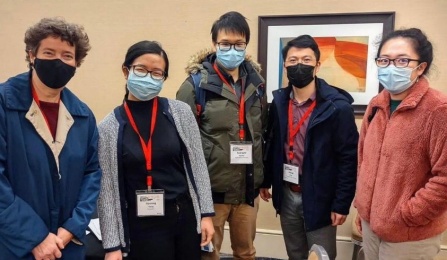
Department Chair Kristin Stapleton gathers with UB History graduate alumni Xuening Kong, Guangzhi Huang (American Studies), Xiangli Ding, and Qiong Liu at the annual American Historical Association meeting in Philadelphia in January 2023.
Averill Earls (PhD '16) was awarded the North American Conference on British Studies Gale Digital Scholar Lab Fellowship. Dr. Earls is now an Assistant Professor of History at St. Olaf College in Northfield, MN.
Molly Giblin (BA '03 and MA '05) was named Director of Programs for Princeton in Asia.
Seymour (Sy) Gitin ('56), Emeritus Dorot Director and Professor of Archaeology at the Albright Institute of Archaeological Research in Jerusalem, published "Tel Miqne-Ekron Excavations 1994–1996, Field IV Upper and Field V, The Elite Zone Part 1: Iron Age IIC Temple Complex 650."
Phillip Guingona (PhD '15) created a curricular module called “Unsovereign Space,” published by the History for the 21st Century Project. The module helps teachers and their students explore how studying the governances and mapping of colonial spaces across time can help us consider how we navigate and regulate outer space and cyberspace in the 21st century. Guingona and the directors of the H21 Project presented the new module in Pittsburgh in June 2023, at a meeting of the World History Association.
Alexandra Prince (PhD '20) is an assistant professor of Religious Studies at Skidmore College in Saratoga Springs, where she has been a Visiting Assistant Professor.
Violetta Ravagnoli, (PhD '15) contributed an essay on teaching about East Asian via graphic history books in the fall 2022 edition of the World History Bulletin, a publication of the World History Association.
Paul Rodell (MA '82 and PhD '92), Professor Emeritus, Department of History, Georgia Southern University, recently co-edited, Special Report the Global South and Ukraine which broadens the discussion beyond its usual European/Global North focus.
Greg Witkowski (PhD '04) published an edited collection entitled Hoosier Philanthropy: A State History of Giving.
Thank you for your support of the Department of History! With the support of alumni and friends, we can access vital resources to enhance our department and provide support for students, research projects, and programs. We are grateful for your generosity.
You can support your department and help to provide for our students by making a gift online.
